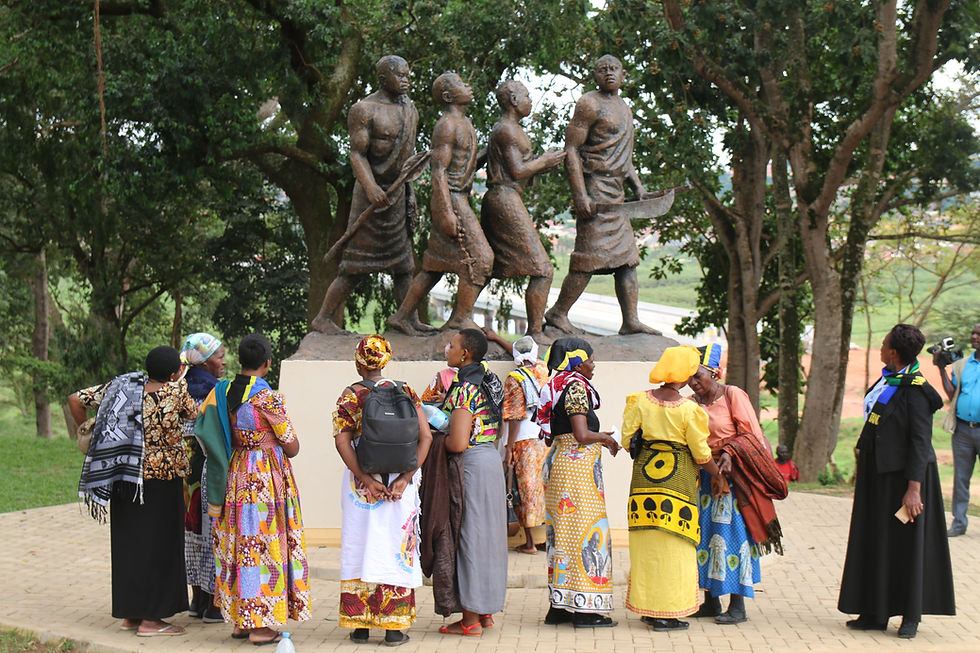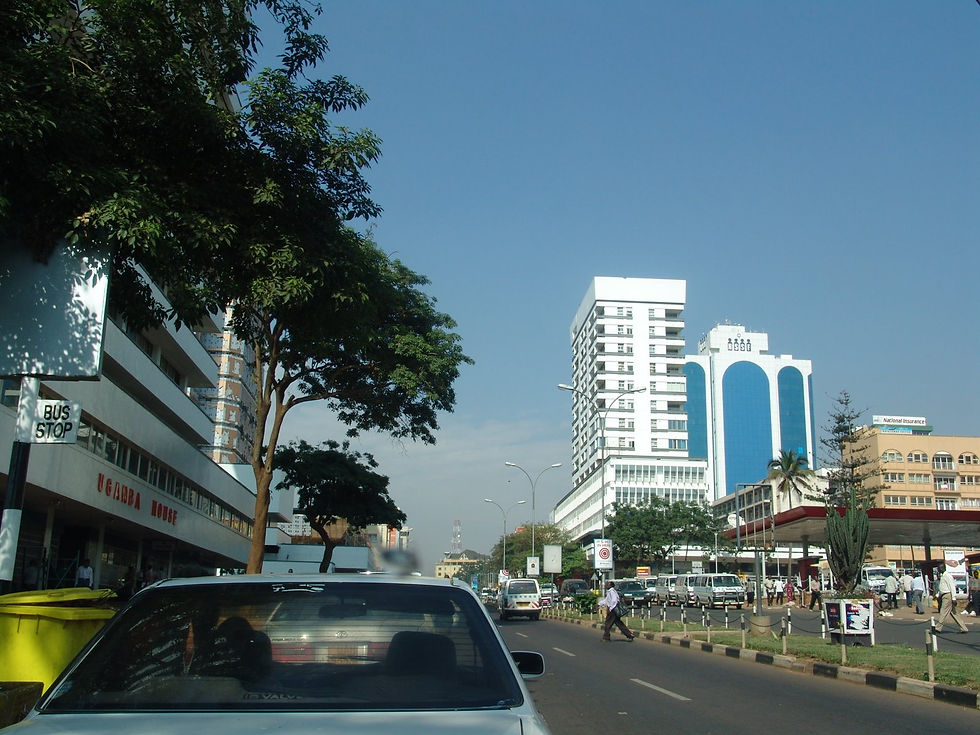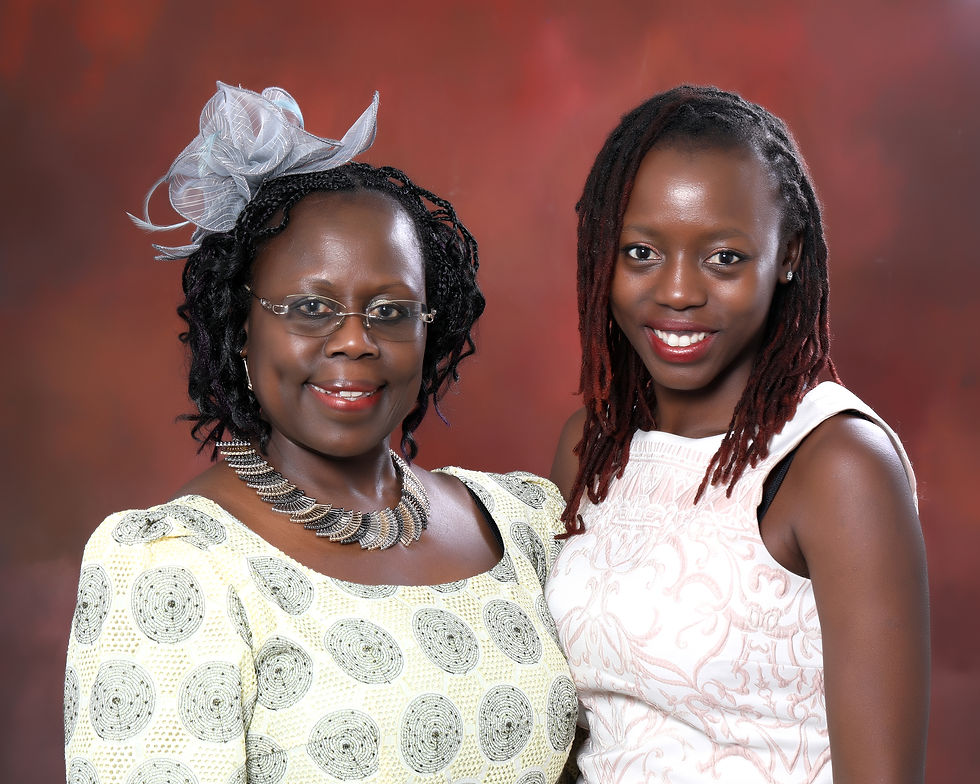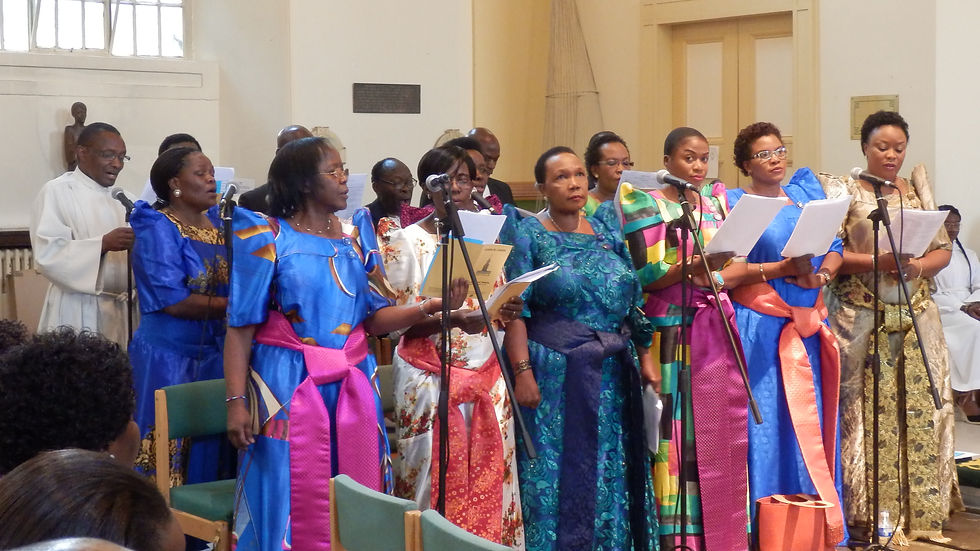Okusinza mu Luganda #2: Language, prayer and community
- Waterloo Festival Team

- Jun 3, 2020
- 9 min read
Updated: Jun 22, 2020
by Shanon Shah

Monument of Uganda Martyrs and their oppressors, walking towards Namugongo, erected in Munyonyo on the spot from were the journey on 26th May 1886 started.
Today, 3 June 2020, marks Ugandan Martyr’s Day – traditionally a festive affair in Namugongo, but scaled down considerably this year because of the Covid-19 pandemic. At St John’s Church, Waterloo, the Okusinza mu Luganda (Worship in Luganda) congregation has usually celebrated Martyr’s Day on the first Sunday of every June in a wonderful feast of prayer, worship, music, food, fellowship and sunshine.
The lockdown notwithstanding, the Waterloo Festival is thrilled to publish our series of interviews to raise the curtain for Okusinza’s 30th anniversary celebrations throughout 2020 and 2021. This time, we feature Dorothy Mukasa, who spoke to Waterloo Festival Programme Committee member Shanon Shah via Skype in early April. The conversation was so rich that we are featuring it in three parts. In this first part, Dorothy traces how the Ugandan Bush War galvanised her into human rights activism, which then led her to HIV/AIDS advocacy as well as becoming co-founder of Okusinza mu Luganda.

Kampala Road, Kampala, Uganda (2007)
SS: Thank you so much for agreeing to this interview, Dorothy. Where were you born?
DM: I was born and raised in Kampala, Uganda, the second child of seven. I went to Norman Godinho Primary School (now Buganda Road Primary School), and then to Gayaza High School. Then I went to Uganda College of Commerce for about a year and a half before coming to the UK to complete the qualifying course of the Institute of Chartered Secretaries and Administrators [now known as the Chartered Governance Institute].

SS: What was it like growing up before the civil wars?
DM: Well I came from a middle-class background – mother was a nurse, father worked for a parastatal body. We were seven siblings raised in a big house, with a large garden, dogs and cats. I was unaware of what a good life I had until I got to secondary school. At boarding school, you observe others and realise how difficult people’s lives are. So, my life, especially in primary school, was wonderful.
My father’s career was on the up and the family moved to bigger homes. The economic pinch started, when Idi Amin became President via a coup d’etat in 1970. The economy was very badly affected by his expulsion of Asians in 1972, and government salaries diminished. Families struggled and could afford less than before. But my father still had us in schools, we were well-dressed in our uniforms and our fees were paid up. I may have felt it was a tough life, but I was living a better life than many others.
SS: And then the civil wars happened….
DM: The civil wars had a huge impact on my extended family. There was a lot of killing and raping and mass graves in an area called the Luwero Triangle where we are originally from. The soldiers came marching through rural villages ransacking homes and killing civilians. Several of my father’s brothers were hacked to death. My grandmother, aunts and cousins were marched miles into camps in Ndejje. They lost their homes. My mother was a nurse at Mulago Hospital – she persuaded the Red Cross to take her with them to the Ndejje camp in an effort to rescue my grandmother, aunts and cousins. They had no food or water in the camps and there was a lot of disease.
Meantime, I was in London by this time. Because of all that killing and suffering of innocent civilians in rural areas, I had joined the Ugandan Group for Human Rights. The idea was to try and raise the UK’s consciousness to the atrocities and through international pressure get people out of camps in rural areas. Because I was personally affected and had a lot of knowledge of what was going on, I was an active member and attended every meeting, informing them what had happened last week, last month.
When I joined the Ugandan Group for Human Rights, I was quite young but rose up to the ranks of Secretary. We were writing letters to Parliament, to Margaret Thatcher, “Can you help Uganda?”, talking to Amnesty International and newspapers like The Guardian. It was this activity that got me involved in community engagement. Speaking individually is ineffective, but if we stand as one, like how we went to the Human Rights Commission and other influential places, we made an impact.
SS: But during that period, were you effectively locked down in the UK for a while?
DM: The civil wars in Uganda began in 1980 and lasted to 1986, making it impossible to return home. Yes, so a bit like now, suddenly you can’t fly. The Home Office extended our visas and eventually we acquired permanent residence. I didn’t return to Uganda for seven years. Phone calls were very expensive but they were possible. Without WiFi, smartphones or WhatsApp I wrote to my parents once a month. When I arrived early 1980, £1 was foreign exchange my father could afford to buy and send to me. The wars reduced the value of the Ugandan Shilling such that he could no longer afford to send funds for me and my brother. So, we started working. By the time [current president Yoweri] Museveni was leader, our lives had moved on. I had taken on several jobs and eventually worked for Hackney Council. After Museveni became president, I was able to visit Uganda more regularly. The regime had changed and travelling was not considered exotic.

Yoweri Museveni, President of Uganda
Photo: Russell Watkins/Department for International Development - London, 2012
SS: And were the meetings of the Ugandan Group for Human Rights held in the Christian hostel beside St John’s Church?
DM: Yes, they were held at the Christian Alliance Centre, in the basement, once a month, up to 50 of us. It wasn’t without consequence. Everyone was hoping that if pressure was made to bear on the UK politicians, maybe their relatives could escape from their situation with their lives.
SS: How did you go on to become a community activist?
DM: I often ask myself that. “How did I get up to my neck in this or that initiative?” On reflection it was a slow process, I became an activist over time. Working in Hackney, I became involved in the National and Local Government Officers’ Association (NALGO) Union’s Free Nelson Mandela campaigns. We wore badges, went on marches, learnt marching songs as we waved banners whilst Mandela was in prison. During the late 1980s and early 1990s I observed politically instigated suffering. People were displaced. They lost their land and homes, resulting in long term poverty and deprivation, illness, and lots of bad things. I became involved in trying to change these conditions.

Nelson Mandela at the LSE, London (2012)
SS: Where did that activism take you?
DM: It was during those years that the AIDS epidemic began, and it evidently affected the Ugandan community. Many contracted the virus and died, in Uganda and here in the UK. I was by then a person who could mobilise opinion and people. So, we started something called the Uganda AIDS Action Fund [in 1987]. The fundamental founders were quite a few people from the Ugandan Group for Human Rights. We did a lot of prevention, awareness raising, disseminating information about how the virus is transmitted, how you can keep safe. There was a lot of fear and stigma in the community around HIV and AIDS.
In the UK, the majority of HIV cases were amongst gay men, and secondly African communities. Amongst the Africans, women came to national attention because they breastfed babies, which was a way of transmitting the virus. In the early days, social workers and nurses tried to instruct women to stop breastfeeding. But women breastfed in hiding for cultural reasons. To be a good daughter-in-law, you had to be seen to be nurturing your babies. My activism kicked in – there was a need to understand issues of language and culture, gender, lack of voice, and the need of advocacy for women. I slowly relinquished my involvement with the Uganda Group for Human Rights – by this time, it was a company and charity and could effectively be run by a Board of Trustees.
I then left Hackney Council to work for Tower Hamlets Social Services, developing Strategy and Policy around HIV. I was very much an advocate for women with HIV, and was noticed during one of many presentations, and headhunted and seconded to work for the Department of Health as the Ethnic Minorities Advisor for a couple of years.
In 1988 the AIDS Coalition to Unleash Power (ACT-UP) organized a demonstration at FDA headquarters in Rockville, Maryland, to protest for greater access to investigational drugs to help treat AIDS patients.
That was when, with a number of other people working in the National Health Service, we decided the best way to address the HIV epidemic in Africans was to start the African Health Policy Network (AHPN). That brought together a broad range of African communities, from East to South Africans, West Africans, and North Africans. Mobilising communities was not difficult for me and I would target High Commissions – I knew where the Tanzanians were if I needed them, I knew where the Kenyans were, and so on.
The AHPN became a British charity that gave a collective voice to African women and men. They trained and developed to be advocates, to stand up and talk about HIV – Africans were the face of the African epidemic in the UK. It attracted Government funding which enabled prevention work to penetrate communities. The many rumours that AZT would cause one’s teeth to fall out could be addressed.
The fake news about Covid now is nothing compared to the conspiracy theories around HIV at the time. The panic! The idea that the people who are obviously emaciated were the only ones who were infected had to be dispelled. There were many people who were HIV positive without symptoms. The current conspiracy theory that 5G is spreading Covid – where do these rumours come from? Such theories are here now, and were around during the HIV epidemic, too. When I hear rumours about this being a Chinese conspiracy, I’m thinking, no, we’ve been here before. There is no conspiracy. It’s a virus.
Protestors in Wisconsin, USA (April 2020)
The experiences of HIV forced gay men and African communities together – that’s when we started to bond. These were two communities that found themselves on the same wards in hospitals and regularly at funerals together. Facing the funeral directors was an alien thing for young Africans. We were a bit shy and apprehensive, unable to decide. I had these gay men friends, and they said to me, “Dorothy, you need to know how to choose the material that goes inside the coffin!” And they would drag me along until I learned. And then I would take other Ugandans and give them advice. Things like, “When you go the funeral directors’, don’t leave it to them, you have a choice of this, that and other. You need a zinc-lined coffin to transport your body abroad.” Throughout all of that, I was handheld by tough gay men who thought I was going to wilt (laughs).
SS: (Laughs.) What do you do now, Dorothy?
DM: I have a Master of Science in Public Policy, so I’ve always worked in public policy in local authorities and in the NHS. I then did a second masters in Medical Ethics and Law at King’s College London, at the Strand Campus. I now work for the NHS on a contractual basis.

Dorothy and her daughter, Kulaba Kyabanji (courtesy of Dorothy Mukasa)
SS: So, your life is basically defined by service, whether your day job or your human rights activism – which I’m assuming was done outside of working hours, in the evenings and on weekends?
DM: Yes, few people know what my formal employment is. Since the early 1990s people associate me with Okusinza, and those organisations where I was a founder member.
The beginning was human rights, then HIV in the African community. People with HIV often suffered in isolation with few community links. In the 1980s the Ugandan community did not have activities that brought them together regularly, so there was a lack of cohesiveness. When we started Okusinza Mu Luganda, the principle was that people had a common language, a Bible and hymn book and these should be used regularly throughout the year, rather than at times of bereavement only.
Reverend Henry Settimba kindly offered us his church in All Saints Westham, and that is where we started having regular Luganda services. In the beginning we would pray with the Catholics and the Seventh-Day Adventists – anyone who used the Bible would turn up. Slowly the community grew. Then the Seventh-Day Adventists were grateful for the good foundation, but their Sabbath was actually on a Saturday, so they left and continued holding their Luganda service on Saturday. They’ve never looked back and they’ve done very well – huge numbers! Then our Catholic friends also decided they had been given a good foundation, and shown how this can be done properly. They departed to hold Luganda services elsewhere, and have been very successful and in 2019 they celebrated their 25th anniversary. But we remain firm friends.
One of the things the Church really offered was a place where people could go when somebody had died. Anyone who wasn’t in an HIV-ravaged place in the 1990s will never be able to imagine. There were coffins everywhere.

Okusinza Choir (courtesy of Stephen Kafeero)
Click here for part 2 of our interview with Dorothy Mukasa where she further explains the centrality of language to Okusinza’s identity.
Read more about Okusinza mu Luganda here.




Comments